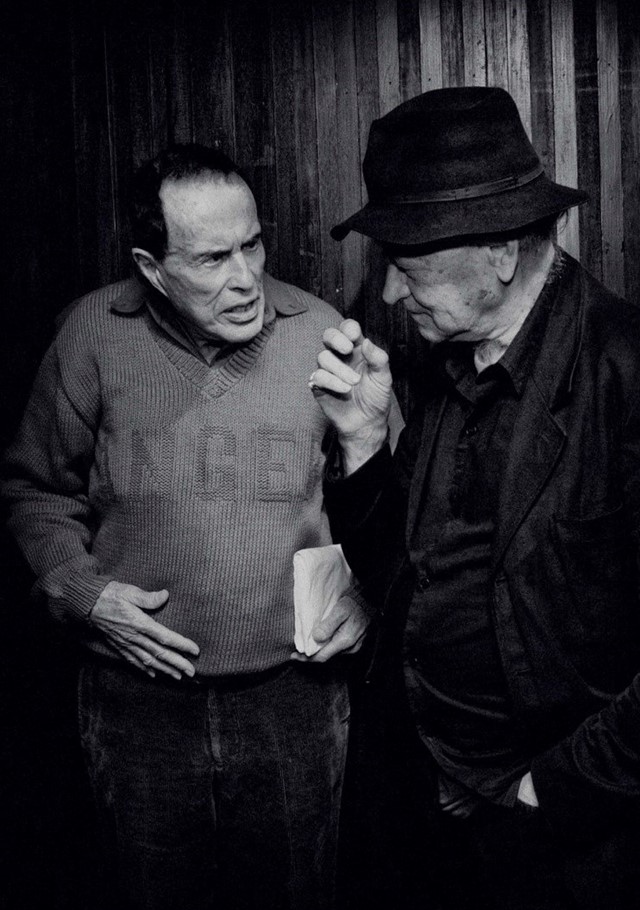As the Lithuanian filmmaker passes away, we revisit an interview in which he shares advice for those wanting to follow in his footsteps – and his thoughts on Lady Bird’s Oscars snub
- TextZoe Whitfield
It’s 10 o’clock on a Tuesday night and Hans Ulrich Obrist is sat before 200 film fanatics at south London’s Peckhamplex, iPhone in hand, recording the nonagenarian with whom he’s sharing the stage: Jonas Mekas. The Lithuanian filmmaker, dubbed “the godfather of American avant-garde cinema”, is sporting the mask of a German Shepherd and delivering a speech about the decline of small gallery spaces in New York. Later in the evening, he makes a case for needing nervous breakdowns, suggesting that “the more you use energy, the more you have of it.” And, when Another Man meets him in Bloomsbury the following day, he reaffirms this statement, informing us that he went to bed at 2am.
Born in Lithuania on Christmas Eve in 1922, Mekas emigrated with his brother to the US in 1949, settling in New York. Initially exploring experimental film via the city’s independent film societies, the siblings founded the magazine Film Culture in 1954. By 1958, Jonas was writing a ‘Movie Journal’ column for The Village Voice, the interviews from which form a new book, Conversations with Filmmakers. “My writings in The Village Voice are usually passionate, almost irrational,” he reflects. “When I like something I want others to see it and I want to tell them why they should see it, so it’s like almost love letters. I was not a critic – I was a passionate, enthusiastic viewer of their work.”
A peer to figures such as Susan Sontag and Stan Brakhage, both of whom feature in the new title, Mekas collaborated with Andy Warhol on his 1964 standout Empire, while his circle extended to The Velvet Underground (whose first gig he shot), John Lennon and Yoko Ono. The nucleus of his own work has always been the present day: the filmmaker is primarily a diarist, and he uses the camera as a vehicle for observing the superficially ordinary. “You have no choice. We all live in the present and the camera cannot record the past,” he explains. “Why some of us focus on one aspect of reality, there is no real answer.”
With the arrival of early 00s documentary, As I Was Moving Ahead Occasionally I Saw Brief Glimpses of Beauty on MUBI, below Mekas shares some advice for aspiring filmmakers.

1. Just get on with it
“Why do you want to make films? Only make films if you feel that you have a necessity to make them. Then you will find a way of doing so – nobody will be able to stop you. Just get a camera and do it, and as you do it you will discover what you really want to make. Don’t listen to anybody who tells you how, or what.”
2. Don’t listen to critics
“No criticism is valuable for a filmmaker or a poet or a musician. Practically, OK, if you are doing something wrong then you will never learn. You have to know the possibilities of what the camera can do. But criticism is never of any value, because whoever criticises has his or her ideas, and who needs the ideas of others? I’m making my thing. I create my own kind of autobiography. You see the detail, you see the period, you see the people, but it’s through my eyes.”
3. Pursue inspiration beyond your medium
“I see fewer films and I do more reading; I think contemporary cinema is very, very bad and boring. I read a lot of classics, like now I’m with Virginia Woolf for instance. When I re-read the books that I had to read in school, I find that it’s not the book that I read; I see much more in it. Before one read, maybe for the story, and missed everything else that was in the book. It’s the same with the films: some become much better when you see them again, others collapse.”
4. Embrace solitude
“There is no team, it’s me. I am alone, I do everything. We are all individuals, you know, in society. I never know where I will film or what I will film. In a way as individuals, as humans, each of us is alone but really I never feel lonely. I’m always with people, with the books I read. Loneliness is something else then alone, and there are so many ways to be with others. In that sense, I’m never lonely; like now I’m very much with Virginia Woolf [laughs].”
5. Don’t give a damn about the Academy
“Greta Gerwig’s film Lady Bird is very unique and very, very, very special. It’s well made and with subtle nuances – a man could not make this film. OK, the Oscars passed it, but I think it’s the best film of the year. Not easy to make, there is no big action, everything is in the small but subtle details. Also Jim Jarmusch’s Paterson, it’s a perfect little film. It’s a film that never reaches Oscar nominations [laughs], it’s too good to go to Oscars.”
As I Was Moving Ahead Occasionally I Saw Brief Glimpses of Beauty is now available to stream on MUBI.











